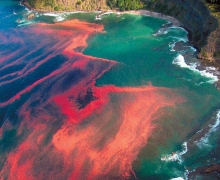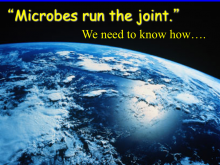- You are here:
- GT Home
- Sciences
- Home
- List of Available Research Projects
Single-celled marine algae are especially chemically rich, producing toxins that kill fish, marine mammals, and seabirds, contaminate shellfish, and threaten human health. Many predators of these algae – copepods – selectively consume less toxic algae, which in turn sense copepods via an excreted blend of copepod-specific molecules. These algae then become up to 20X more toxic when they sense copepod cues in the open ocean.
Seaweeds create toxic compounds to deter consumers (fish) and poison competitors (corals). However specific fishes resist these toxins, and some corals also are resistant to their effects. These tolerances may be due to unusual microbes in the gut microbiomes of fishes and in coral mucus coverings. GT has an unusual mixture of marine ecologists, chemists and microbiologists to address these issues.



